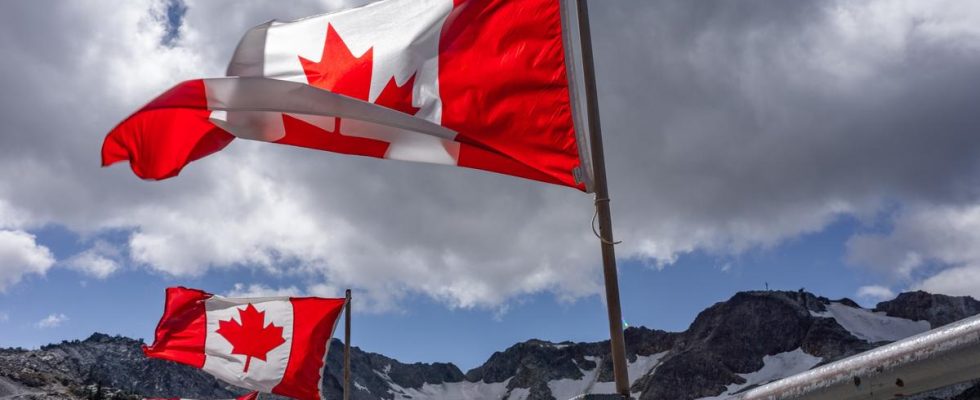Convicted in absentia by a Moscow court, Russian pro-democracy activist Maria Kartasheva had to prove to Canadian authorities that criticizing the authorities of her country of origin is not a crime. After fearing being deported to a Russian prison, she finally obtained the precious sesame on Tuesday evening.
Arriving in 2019 from Russia, Maria Kartasheva has gone through a nightmare in recent months in Canada. The Russian, 30, had the unpleasant surprise of seeing her immigration application rejected during the naturalization ceremony. A pro-democracy activist, she could even have been expelled from the country due to her conviction in absentia by a Russian court for “disinformation» in the context of the conflict in Ukraine. A critic of the Kremlin, the young woman was prosecuted for two articles written in Ottawa. According to the Canadian Penal Code, immigration rules ensure that a citizenship applicant charged with a crime in another country can have their application rejected.
The media commotion caused by this extremely rare case forced the Canadian Minister of Immigration, Refugees and Citizenship, Marc Miller, to intervene on X. “The eligibility rules are designed to bar criminals’ access to Canadian citizenship, not to repress or punish legitimate political dissidents, assures the chosen one. Miss Kartasheva will not be deported and has been invited to become a Canadian citizen.»
At the same time, the good news fell during the young woman’s lunch (5:00 p.m. GMT): an email inviting her to perform her ceremony a few hours later (8:00 p.m. GMT). “I have a feeling I won’t believe it happened even after the ceremony, she assured the Canadian channel CBC. For a long time, I had the impression that no one was interested in this matter.» She hopes that her misadventure will demonstrate “that Canada will support the Russians in Canada who oppose the war, and that we can sleep peacefully“.
Texts on the Boutcha massacre
For the young woman, the troubles began at the end of 2022. She had learned through her family that she had been accused by the Russian authorities of a “crime in time of war» for having broadcast “deliberately false information» on the troops of his country of origin. In question, her blog where she regularly publishes posts on the Ukraine-Russia conflict.
In one of the two publications in question dating from March 2022, on the Boutcha massacre, we can read: “Tell me that before the Russian troops arrived, all these people were alive and riding their own bicycles. I don’t know why it was so ingrained in my memory that there were bikes everywhere, and the dead people who rode them, apparently, were going somewhere“.
Read alsoRussia-Ukraine: the dangerous escalation
Law on false information
Involved, the young woman also participated in other actions, by demonstrating in front of the Russian embassy in Ottawa or by creating a group called Russian Canadian Democratic Alliance (Russian-Canadian Democratic Alliance).
Russia’s fake news law, publicized for its impact on the country’s politicians or journalists, is also used against citizens of the country critical of the Kremlin’s actions. As a result, Russian judge Elena Lenskaya ordered the arrest of Maria Kartasheva in absentia, then last November, the Basnmany District Court in Moscow sentenced her to eight years of imprisonment based on posts published on her blog .
Online ceremony fiasco
When she learned in April 2023 that an arrest warrant had been issued against her, the young woman submitted an application for citizenship in Canada and informed the department responsible for immigration (IRCC: Immigration, Refugees and Citizenship Canada) of the accusations made against him. During May, she received an invitation to her citizenship ceremony.
Maria Kartasheva appears at the ceremony on June 7, alongside her husband. Before taking the oath, an officer asks a standard question, whether a person has been subject to criminal charges. She raises her hand, then an official asks her to leave the ceremony while her husband continues the process and obtains Canadian citizenship. The session ends. She was unable to swear allegiance to the Crown.
Read alsoWar in Ukraine: Canadian parliament receives Nazi veteran during Zelensky’s visit
“I felt betrayed because I hoped to be safe here in Canada, said the young woman, in comments relayed by Radio Canada on January 5. I was heartbroken. But I was also trying to stay positive, because it was still my husband’s ceremony, so I didn’t want to ruin the day for him. I know Canada does not support the war. I know they agree that Russia is silencing people who oppose the war. So I thought it was such an obvious situation that it wouldn’t be a problem.”
“That does not make any sense !”
How can we explain this turnaround? Section 372 (1) of the Criminal Code of Canada states that anyone “commits an offense with the intention of harming or alarming someone, transmits or causes to be transmitted by letter or any means of telecommunications information that he knows to be false» risks up to two years of imprisonment. The ministry confirmed to him in December that his conviction in Russia corresponded to this scenario. “It’s a normal country, she lamented about Canada. You would think that no one would consider me a criminal for opposing the war, but ultimately that seems to be the case. That does not make any sense !»
Read alsoWar in Ukraine: how has the front line evolved in 2023?
Expulsion to Russia avoided
The young woman, who works in the technology sector in Ottawa, faced deportation to Russia. “I know the chances are low, but so many things have gone wrong, she feared. How could I not fear being deported?»
Canada has, however, been a leading ally of Ukraine since the start of the Russian invasion in 2022. The Canadian government welcomed President Volodymyr Zelensky at the end of September, promising him financial aid. He also imposed sanctions on Russian personalities, notably… the judge responsible for the arrest of Maria Kartasheva, Elena Lenskaya.

